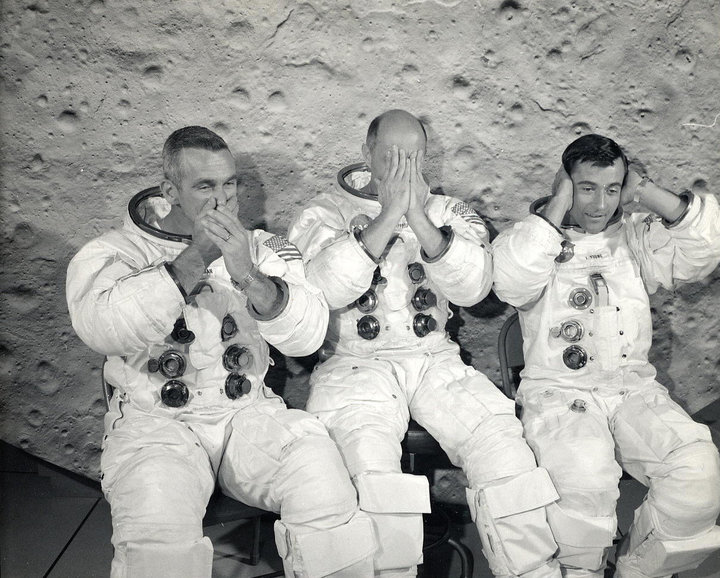(单词翻译:单击)
We usually think of Astronauts in only the most heroic terms.
想到宇航员,我们通常都会浮现出最具英雄气概的那些词。
Brave women and men in peak physical and mental shape who will risk it all to further humanity's reach into the great beyond.
无论男女,个个都很英勇,个个的身心都处于巅峰状态,是他们不顾一切,将人类对浩瀚宇宙的认知一次次推向新的高度。
But as the Japanese author Taro Gomi so eloquently put it, everyone poops.
然而,正如日本作家五味太郎雄辩地指出的那样,是人就免不了要便便。
And NASA is still looking for the number one way to dispose of number two.
而NASA(美国宇航局)至今仍在寻找处理大便(嘘嘘是number 1)的最佳办法。
When we first started taking baby steps into space,
我们刚开始跌跌撞撞地探索太空时,
NASA tried to get around the problem by keeping astronauts from having to go entirely.
通过让宇航员彻底不用便便,NASA选择了避开这一问题。
Weightlessness actually makes poop travel through the body faster,
实际上失重会使便便在身体里运动得更快,
so to counteract this for short missions, astronauts ate a low fiber diet for three days before launch.
所以,在执行短期的航天任务时,为了应对这一问题,宇航员们在升空前三天都要进食纤维含量较低的食品。
The early days of longer crewed missions had the most crude solutions.
而早期执行长时间航天任务时解决这一问题的办法非常的原始。
Apollo astronauts used what was essentially a plastic bag taped to their butts.
阿波罗号宇宙飞船的宇航员们是在他们的屁屁上绑了一个塑料袋。
And yes, the bags were clear, I guess so the astronauts could see if they had the right stuff.
是的,袋子是透明的,我想,这是为了让宇航员看到他们排出来的东西对不对吧。
It may shock you, but dropping space trou and pinching off a brown asteroid into a bag didn't always go smoothly.
虽然听着可能会很震惊,但要想脱掉宇航服裤子,然后夹断一截棕色的那啥到袋子里并非总是那么顺利。
Famously the Apollo 10 mission,
众所周知,阿波罗10号飞船,
the dress rehearsal for the moon landing and the step before the giant leap for mankind,
即为登月所做的彩排,也即在迈出那“人类的一大步”之前的那一步,
had an unexpected passenger along for the ride.
就被一个意外的乘客搭了顺风车。
It happened six days into the mission.
那是那次飞行任务的第六天。
Commander Tom Stafford was the first to notice it: a turd floating around inside the capsule.
指挥官汤姆·斯塔福德是第一个察觉的人:那是一坨漂浮在舱内的便便。
It happened six days into the mission.
那是那次飞行任务的第六天。
Commander Tom Stafford was the first to notice it: a turd floating around inside the capsule.
指挥官汤姆·斯塔福德是第一个察觉的人:那是一坨漂浮在舱内的便便。
Between fits of laughter,
大家发出了阵阵笑声,
the three astronauts on board all denied ownership of said turd,
然而,飞船上的三名宇航员谁也不承认那坨便便是自己的,
claiming they would have known if they had pooped on the floor, or that their poop was more sticky.
人人都说如果自己拉到了地上自己肯定会知道,要么就说他的大便更黏。
Regardless, Stafford stepped up and grabbed the space waste with a napkin, and that's why he was the commander.
不管怎样,斯塔福德还是上前用纸抓住了那坨太空垃圾,这也是他能当指挥官的原因。
To this day, no one has owned up to it, but the transcripts of the exchange are public record.
直到今天,都没有人去认领那坨便便,但三人对话的文字已经公之于众了。
My favorite part is they were at one time marked "Confidential,"
我最喜欢的就是这些对话曾经被纳入了“机密”内容,
presumably to keep the Russians from learning about our top-secret butt bag technology.
可能是为了防止俄罗斯人偷学到我们绝密的便便袋技术吧。
The space shuttle had a more conventional toilet, though it required training with an underseat video camera to master.
航天飞机上的厕所则更加传统,虽然使用这种厕所还需要接受训练,同时座位底下还有一个摄影机。
Yes, space shuttle astronauts were toilet trained twice in their lives.
没错,航天飞机的宇航员一生需要接受两次便便训练(第一次是小时候学上厕所的时候)。
Today astronauts on the International Space Station have a vacuum powered toilet to catch any floaters.
今天,国际空间站的宇航员已经用上了可以捕捉任何漂浮物的真空马桶。
It even has a seatbelt, probably to keep them in place in a microgravity environment,
上面甚至还有安全带,可能是为了让宇航员在微重力环境中保持原位吧,
but maybe in case they have a really intense session, I don't know.
但也可能是为了防止他们便便时场面太过不堪入目吧,谁知道呢。
But we haven't stopped developing space toilets, we've got our eyes and tushies on the prize.
然而,我们一直没有停止太空厕所的研究,我们的眼睛和屁屁都盯着奖品呢。
Yes, there is a prize for a better space loo.
没错,太空厕所设计得好也有奖品拿。
Dr. Thatcher Cardon is a family doctor, a flight surgeon, and a colonel in the US Air Force.
撒切尔·卡顿博士是一名家庭医生兼飞行军医兼美国空军上校。
In 2017 he added "Winner of the Space Poop Challenge" to his many prestigious titles.
2017年,已经拿过众多称号的他又拿到了“太空排便挑战赛”的冠军。
Dr. Thatcher developed a system that allowed astronauts to go to the bathroom while still in their suit, eliminating the need for diapers.
撒切尔博士研发出了能够让宇航员不脱衣服就能上厕所,从此再也不用戴着尿不湿的方案。
The system relies on an air lock at the astronauts crotch.
该系统主要依靠的是宇航员胯部的气锁。
When the astronaut takes off the cap, a self-closing valve keeps air from escaping.
宇航员取下气锁的盖子时,会自动关闭的阀门可防止锁内的空气逸出。
The astronaut can then insert a tube through the valve that can be used to slide a number of things inside the suit,
然后,宇航员就可以将一根管子插入阀门内,各种各样的东西,
like an inflatable bedpan, a bidet, wet wipes, even fresh underwear.
比如充气便盆,坐浴盆,湿巾,甚至是干净的内衣,都可通过这根管子导入到宇航服里。
This technology might not just help astronauts avoid diaper rash,
这项技术或许不仅能让宇航员不再因为戴尿不湿而长疹子,
it could be essential if their spacecraft is pierced by debris and they have to spend days inside their suits.
还能在航天器被碎片刺穿,他们不得不在宇航服内呆好几天时发挥不可替代的作用。
For his sanitation innovation, Dr. Cardon was awarded $15,000, which is nothing to sniff at.
由于贡献了这项卫生创新设计,卡顿博士拿到了1.5万美元的奖金,不少了。
As glamorous as space exploration is,
尽管太空探索看着充满了魅力,
it has a funny way of reminding us that we are still human, and still have to solve some very basic human problems.
它也以一种有趣的方式提醒着,我们仍然是人类,仍然需要解决一些人类非常基本的问题。
Rockets that get us to Mars are important,
能够送我们到达火星的火箭的确很重要,
but making sure the first person to set foot on it doesn't track poop on their boot is important too.
但确保第一个踏上火星的人不会在他们的靴子上发现便便也很重要。
If this video made you laugh, then I'm sorry but you have to subscribe. Those are the rules.
如果这个视频逗你笑了,那不好意思,你得订阅了。规则可不就是这样嘛。
Poop's not the only problematic waste in space.
便便并不是太空里唯一可能带来麻烦的废物。
In 1963 A Mercury capsule had several systems go dark thanks to a leaky pee bag.
1963年,由于小便袋泄漏,“水星计划”的一艘飞船有几个系统都因此崩溃了。
Thanks for watching and I'll see you next time on Seeker.
感谢大家的收看,我们下期再见。


